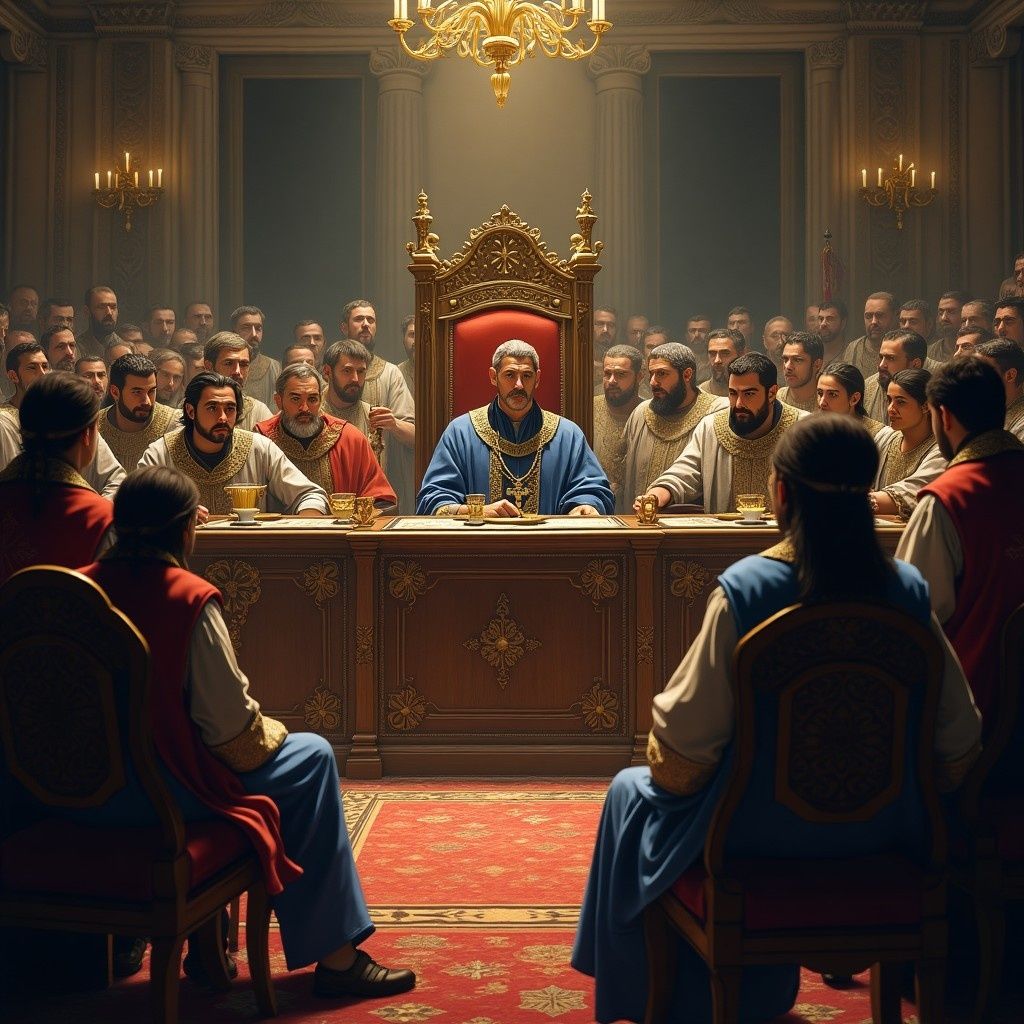The cold January wind howled through the stone corridors of the royal palace in Toledo, carrying with it the weight of change.

The Twelfth Council of Toledo was underway, and its echoes would reverberate across the land for generations. King Erwig, seated on his throne, surveyed the assembly of bishops and nobles with a gaze that spoke of both authority and trepidation. He knew the decisions made here would shape the future of his kingdom. In the midst of the council's deliberations, a figure stood out—a young noblewoman named Elara. Her presence was unusual in such a gathering, but her father, a respected noble, had insisted she attend. Elara was known for her sharp mind and her even sharper tongue, qualities that often placed her at odds with the male-dominated court. Yet, she held her ground, her eyes fixed on the archbishop who was speaking with fervor about the new ecclesiastical decrees. The archbishop's voice rang through the hall, declaring the primacy of the Toledan diocese and the new authority vested in him to consecrate bishops across Spain. Elara's heart clenched at the thought of such centralized power. She had seen the consequences of unchecked authority and feared for those who would suffer under its weight. As the council moved to discuss the laws against the Jews, Elara's unease grew. She had a friend, Miriam, whose family had been forced to convert under threat of violence. The new laws would make it impossible for them to return to their faith without dire consequences.

Elara's mind raced, her thoughts a whirlwind of indignation and helplessness. The discussions shifted to the revised legal code, favoring the nobility and suppressing laws against violence to slaves. Elara felt a pang of guilt as she thought of the slaves who toiled on her family's lands, their lives dictated by whims of those in power. The council's decisions would only tighten the chains that bound them. That evening, as the council adjourned, Elara slipped away from the palace, her cloak pulled tight against the biting wind. She made her way through the narrow streets of Toledo, her destination clear in her mind. She found Miriam in the small, dimly lit home her family had taken refuge in.

The two women embraced, their shared fear and frustration unspoken but deeply felt. "What will you do?" Elara asked, her voice barely a whisper. Miriam shook her head, her eyes filled with a quiet defiance. "We will endure, as we always have. But these laws... they make it harder." Elara nodded, her resolve hardening. "I will do what I can. I cannot promise much, but I will not stand by and watch this happen." As Elara made her way back to the palace, her mind was a storm of thoughts. She knew she was but one voice in a sea of power, but she also knew that change often began with a single spark. The council's decisions were set, but the future was not yet written. In the days that followed, Elara used her position to speak out, to challenge the injustices she saw. She found allies in unexpected places—other nobles who shared her concerns, clergy who questioned the harshness of the new laws. Together, they formed a quiet resistance, a flicker of hope in a world shadowed by oppression. The Twelfth Council of Toledo had indeed marked a significant shift, but Elara was determined that it would not be the final word. In the heart of Spain, amidst the clash of power and faith, a new story was beginning to unfold—one of courage, compassion, and the unyielding pursuit of justice.

The Twelfth Council of Toledo was underway, and its echoes would reverberate across the land for generations. King Erwig, seated on his throne, surveyed the assembly of bishops and nobles with a gaze that spoke of both authority and trepidation. He knew the decisions made here would shape the future of his kingdom. In the midst of the council's deliberations, a figure stood out—a young noblewoman named Elara. Her presence was unusual in such a gathering, but her father, a respected noble, had insisted she attend. Elara was known for her sharp mind and her even sharper tongue, qualities that often placed her at odds with the male-dominated court. Yet, she held her ground, her eyes fixed on the archbishop who was speaking with fervor about the new ecclesiastical decrees. The archbishop's voice rang through the hall, declaring the primacy of the Toledan diocese and the new authority vested in him to consecrate bishops across Spain. Elara's heart clenched at the thought of such centralized power. She had seen the consequences of unchecked authority and feared for those who would suffer under its weight. As the council moved to discuss the laws against the Jews, Elara's unease grew. She had a friend, Miriam, whose family had been forced to convert under threat of violence. The new laws would make it impossible for them to return to their faith without dire consequences.

Elara's mind raced, her thoughts a whirlwind of indignation and helplessness. The discussions shifted to the revised legal code, favoring the nobility and suppressing laws against violence to slaves. Elara felt a pang of guilt as she thought of the slaves who toiled on her family's lands, their lives dictated by whims of those in power. The council's decisions would only tighten the chains that bound them. That evening, as the council adjourned, Elara slipped away from the palace, her cloak pulled tight against the biting wind. She made her way through the narrow streets of Toledo, her destination clear in her mind. She found Miriam in the small, dimly lit home her family had taken refuge in.

The two women embraced, their shared fear and frustration unspoken but deeply felt. "What will you do?" Elara asked, her voice barely a whisper. Miriam shook her head, her eyes filled with a quiet defiance. "We will endure, as we always have. But these laws... they make it harder." Elara nodded, her resolve hardening. "I will do what I can. I cannot promise much, but I will not stand by and watch this happen." As Elara made her way back to the palace, her mind was a storm of thoughts. She knew she was but one voice in a sea of power, but she also knew that change often began with a single spark. The council's decisions were set, but the future was not yet written. In the days that followed, Elara used her position to speak out, to challenge the injustices she saw. She found allies in unexpected places—other nobles who shared her concerns, clergy who questioned the harshness of the new laws. Together, they formed a quiet resistance, a flicker of hope in a world shadowed by oppression. The Twelfth Council of Toledo had indeed marked a significant shift, but Elara was determined that it would not be the final word. In the heart of Spain, amidst the clash of power and faith, a new story was beginning to unfold—one of courage, compassion, and the unyielding pursuit of justice.
The Twelfth Council of Toledo, convened by Visigothic King Erwig in January 681, marked a significant shift in ecclesiastical and legal structures in Spain. This council solidified the primacy of the Toledan diocese by granting its archbishop the authority to consecrate bishops across Spain, thus centralizing religious power. It also enacted harsh measures against Jews, including laws prohibiting them from reverting to Judaism after conversion. The council revised the legal code to favor the nobility, suppressed laws against violence to slaves, and adjusted the timing of provincial synods. These changes reflected a consolidation of royal and ecclesiastical power, impacting religious and social dynamics in the region.


Comments
Post a Comment